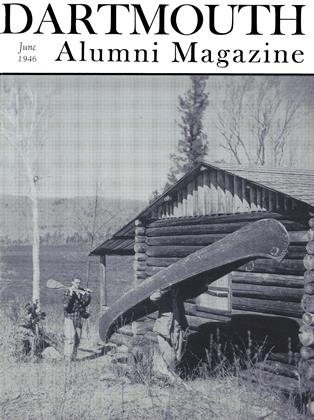THE financial problem facing the privately endowed college today has been brought into sharper focus for all Dartmouth men by the action of the Board of Trustees increasing the College's annual combined fee from $450 to $550, effective next fall. President Dickey's excellent statement of the essential facts and principles which have guided the Trustees in their decision is printed in full in the College News section of this issue, and it is not our purpose here to go into over-extended explanation of a situation that posed for the College not so much the question of "what" as the question of "how much" and "when." To anyone at all conversant with conditions prevailing beyond the campus, and aware of the impossibility of meeting rising costs with a relativfely fixed income, the inescapability of Dartmouth's action will be easily understood. A nationwide survey made by Benjamin Fine and published in The New York Times of May 22 gives striking evidence that Dartmouth is not alone either in its financial problem or in the increased student fee which it has adopted as a partial answer.
Among the various aspects of the Trustees' action which are of special interest to the alumni, none will outweigh in importance or will elicit a greater measure of support than the announced determination of the College to maintain itself as a democratic cross-section of the young manhood of the nation and to make all adjustments necessary in its financial aid program to insure that the increased fee will not place a Dartmouth education beyond the reach of qualified men of limited financial means. It is almost certain that the College will be called upon to broaden such aid at the same time that it is called upon for increased amounts in individual scholarships and loans, but there is nothing ambiguous about President Dickey's statement that "no qualified man who wants to attend Dartmouth and who really requires some measure of assistance additional to that received by every student [in the form of endowment income and gifts to the College] need have the slightest hesitation in seeking such additional assistance either in scholarship or some other form of financial aid by the College." The announcement of Dartmouth's increased annual fee is being taken, in fact, as an opportune time to emphasize what has not always been clearly understood; namely, that it is no more difficult for the outstanding man of limited means to come to Dartmouth than it is for him to enroll at any of the other top-level colleges with which Dartmouth is usually grouped. The notion that Dartmouth is an "expensive" college has been too generally held, thanks mainly to a misleading comparative study of some years back, and Dartmouth alumni wholeheartedly support President Dickey's positive statement about students from the lower end of the economic scale and his declaration that "we want more, not fewer, of them in the future." Backing up these words with increased scholarship funds does not lighten the College's financial burden, but the Trustees have boldly stated the only policy that Dartmouth men would have wanted them to state—and the only policy that will keep Dartmouth Dartmouth.
Along this same line, the alumni will surely applaud the careful thought which the College gave to the effect of the increased fee upon the G.I. student. Consultation with officials of the Veterans Administration was early undertaken, and the ruling that increased annual coverage will be provided, at the cost of a proportionate reduction of the period of entitlement, means that in the vast majority of cases the Dartmouth veterans, even on the higher annual basis, will be able to complete their college courses without exhausting the periods of government-financed education to which they are entitled. In any special hardship cases, President Dickey has announced, the College stands ready to provide help.
The fact that the College, through endowment income and gifts, does bear so large a share of the cost of educating every Dartmouth man is something which is often lost sight of by both undergraduate and alumnus. There are few Dartmouth men who feel that it is within their power ever to repay the College for the tangibles and intangibles which it has added to their lives, but the unparalleled record of alumni interest and support indicates also that there are few who are not having the satisfaction of doing what they can to make the Dartmouth experience, in ever richer measure, available to the young men coming after them. The thousands of dollars of increased income to be derived from the new combined fee will provide only a partial answer to the financial problem of Dartmouth as a privately endowed college, and amidst all the thoughts of next year it needs to be remembered that the Trustees' action has no bearing upon the sizable operating deficit for 1945-46 which the current Alumni Fund has set out to obliterate. The opportunities of the liberal arts college to render service to the individual man and to society are so unlimited, and take so many new forms with changing conditions, that the full support of the alumni will never be less than in- dispensable. As has been so true in the past, Dartmouth can become only what her sons want and help her to be.
WITH THE CONNECTICUT BACK TO A FLUID STATE, THE DARTMOUTH CREW RESUMES WORKOUTS
 View Full Issue
View Full Issue
More From This Issue
-
 Class Notes
Class Notes1918
June 1946 By ERNEST H. EARLEY, DONALD L. BARR -
 Article
ArticleThe Show Went On In Spite of Wartime Setbacks
June 1946 By HENRY WILLIAMS, -
 Article
ArticleUnited States Foreign Policy and Europe
June 1946 By JOHN C. ADAMS, -
 Article
ArticleA Hard Job of Education A Hard Job of Education
June 1946 By JOHN W. FINCH -
 Article
ArticleThe Truth About China
June 1946 By WING-TSIT CHAN, -
 Article
ArticleRussia and the United States
June 1946 By OLIVER J. FREDERIKSEN '16














